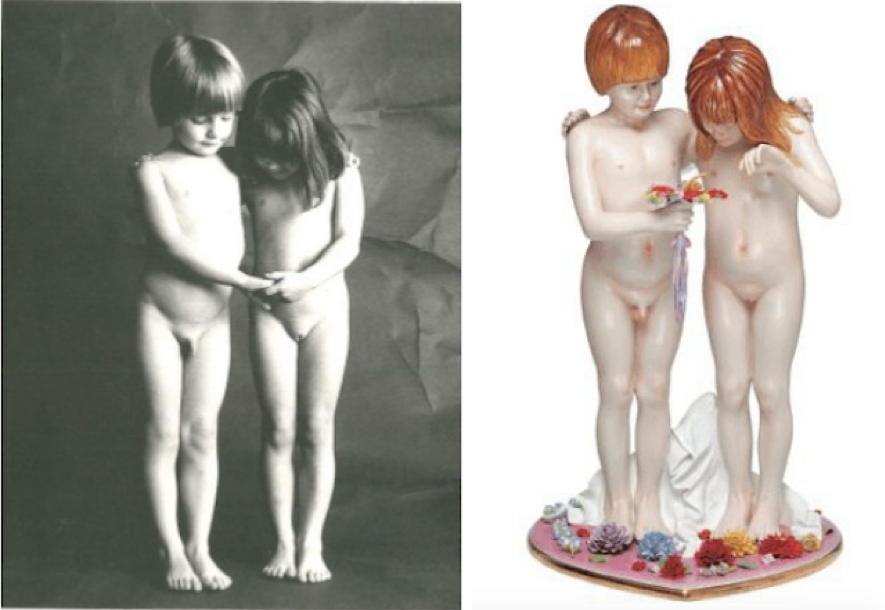In this post, we echo an interesting French copyright case, in which the heirs of photographer Jean-François Bauret sued famous American artist Jeff Koons for the infringement of the copyrights held on the photograph "Enfants" as a result of the sculpture "Naked", part of the collection of works called "Banality", in which the American artist mixes pop-art and kitsch. The procedure was also addressed to the Centre Georges Pompidou, which was to host, at the time of the facts, an exhibition of the American artist of which the sculpture at issue was a part.

(“Enfants” on the right and “Naked” on the left)
In view of the above, the heirs of the deceased French artist sent a C&D letter to Jeff Koons and to his company Jeff Koons LLC, in which they requested the cancellation to exhibit the contested work in Paris, as well as the elimination of any reproduction of the mentioned sculpture in brochures or catalogues published about the exhibition. In the absence of a reply, the claimants also sent another C&D letter, but on this occasion to the Centre Georges Pompidou. Finally, the sculpture at issue was not exhibited as a result of the damage suffered during its transfer to Paris, although its image had been reproduced in catalogues on the exhibition and in reports broadcast on French television.
As a result, the heirs of Jean-François Bauret were forced to file the corresponding claim for copyright infringement against Jeff Koons, his company and the Centre Georges Pompidou, for the infringement of the copyrights held on the photograph "Enfants", and to seek compensation for the damages suffered from the patrimonial point of view (for the illicit reproduction and public communication of the work) and from the breach of moral rights of the author (for the violation of the right of paternity and for having transformed the original work of the photographer).
The defendants argued basically that (i) the work is not entitled to protection under the Code de la Propriété Intellectuelle as it is not an original work; (ii) the sculpture "Naked" does not reproduce the elements of the earlier work, although the existence of an inspiration is acknowledged; (iii) the message conveyed by Koons differs substantially from Bauret's message, since whereas the representation of the children in "Naked" portrays Adam and Eve together with the birth of sexual desire, the prior work seeks to convey the purity, tenderness and purity of childhood, without any sexual connotation; (iv) the work "Naked" is covered by freedom of expression and (v) the exception of parody applies.
In its Decision of 17 December 2019, the Cour d'Appel de Paris upheld the heirs of the French photographer, confirmed the Decision made at first instance by the Tribunal de Grande Instance de Paris, and condemned once again the most famous art transformer to plagiarism.
The French Court of Appeal first upheld the originality of the photograph "Enfants", and ultimately its protection under copyright law, pointing out that the photograph "Enfants" is the result of the combination of various elements expressly chosen by Jean-François Bauret (naked children photographed in a black and white studio, without any accessories, standing in a specific geometric form), as well as of the photographer's creative and aesthetic choices, whereby the personality of the author is reflected in the work.
On the other hand, as regards the existence of an infringement of the rights conferred by the original work, the French Court notes that Koons has reproduced in his work "Naked" the combination of all the characteristic and essential elements which give the photograph "Enfants" its original character, regardless of whether the sculpture at issue has incorporated additional elements which are not reflected in the original photograph (as in the case of the bouquet of flowers, which gives the sculpture "Naked" a different meaning from Bauret's work).
Finally, Koons claimed that there were exceptions to Bauret's exclusive right to the photograph "Enfants" (and ultimately to his heirs), which are his freedom of expression and his freedom of artistic creation, the existence of "fair use" in the context of the artists' inspiration, as well as the existence of a parody of the original work, in view of the fact that he was inspired by photography to convey a message opposite to that of "Enfants".
With regard to freedom of expression and artistic creation, the Paris court -while recalling that a fair balance must be sought between these fundamental freedoms and copyright- rejects the arguments put forward by the defendants, since the use of Bauret's photograph was not necessary for Koons to be able to express his artistic freedom, as he could have used many other images of children to express his message that were not the result of an original work, regardless of whether or not the public was aware of the work "Enfants", which is the source of his inspiration.
With regard to the parody, the Court rejects its application in the case at hand, pointing out that the requirements set by the European Court of Justice in the Judgment of 3 September 2014 are not met, insofar as the "Naked" sculpture is not of a humorous nature, and is not likely to provoke laughter from the public or to allow the identification of the original work by Bauret.
The Court of Appeal therefore ordered Koons and the Centre Georges Pompidou to jointly and severally compensate the heirs of the French photographer for the pecuniary damage suffered and the infringement of Bauret's right to authorship of the work "Enfants", although the court rejects the claim of infringement of moral rights on the ground of lack of respect for the original work, inasmuch as the French court considers that the sculpture "Naked" is also the expression of Koons' artistic choices, as well as of his sensitivity, and therefore also enjoys copyright protection.
